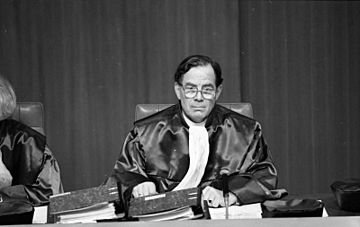Ernst-Wolfgang Böckenförde facts for kids
Quick facts for kids
Ernst-Wolfgang Böckenförde
|
|
|---|---|

Böckenförde in 1989
|
|
| Born | 19 September 1930 |
| Died | 24 February 2019 (aged 88) Au, Baden-Württemberg, Germany
|
| Education | University of Münster |
| Organization |
|
| Known for | Böckenförde dilemma |
| Office | President of the Federal Constitutional Court of Germany |
| Awards |
|
Ernst-Wolfgang Böckenförde (19 September 1930 – 24 February 2019) was an important German legal scholar. This means he was an expert in law and how it works. He also served as a justice (a judge) on Germany's highest court, the Federal Constitutional Court.
Böckenförde was a professor at the University of Freiburg. He wrote many books and articles. These writings were about law, how governments work, and ideas about politics and religion. He is well-known for a special idea called the Böckenförde dilemma.
Contents
Ernst-Wolfgang Böckenförde's Life
Early Life and Education
Ernst-Wolfgang Böckenförde was born in Kassel, Germany, on September 19, 1930. His father was a forester. Ernst-Wolfgang went to school in Kassel. He finished his high school studies there.
He studied at the University of Münster. In 1956, he earned a PhD in law. Later, in 1960, he received another PhD in history from the University of Munich. He continued his studies and became a professor in 1964.
A Career in Law and Teaching
Böckenförde became a professor at the University of Heidelberg in 1964. He taught about public law and the history of law. Later, he moved to the University of Bielefeld in 1969. In 1977, he joined the University of Freiburg. He stayed there until he retired.
From 1983 to 1996, Böckenförde served as a judge. He worked at the Federal Constitutional Court. This court makes sure that laws follow the German constitution. It is a very important role in Germany.
Public Service and Beliefs
Böckenförde was a member of the Social Democratic Party of Germany (SPD) since 1967. He was also a practicing Catholic. He worked with different Catholic groups. He also helped a special government group. This group looked at how to change the constitution.
Awards and Recognition
Böckenförde received many awards for his work. He got honorary doctorates from several universities. These included the University of Bochum and the University of Tübingen. He also received the Reuchlin Award.
Other important awards included the Romano Guardini Award. He also received the Hannah Arendt Prize for Political Thought. In 2012, he got the Sigmund Freud Prize. In 2016, he received the Grand Cross of Merit. This is a very high honor in Germany.
Important Ideas
The Böckenförde Dilemma
Ernst-Wolfgang Böckenförde is famous for an idea from his 1964 article. This idea is known as the Böckenförde dilemma. It states: "The liberal secular state lives on premises that it cannot itself guarantee."
This means that a country that is free and not based on religion needs certain values to work well. But the government itself cannot force people to have these values. Things like trust and shared beliefs are important. These values often come from things like religion or culture. The state relies on them, but it cannot create them by law.
Later Life
Böckenförde lived in Au near Freiburg. He passed away on February 24, 2019. He was 88 years old.
Writings (English translation)
- Ernst-Wolfgang Böckenförde (1991): State, Society, and Liberty: Studies in Political Theory and Constitutional Law. Berg, New York.
- "The Concept of the Political as the Key to Understanding Carl Schmitt’s Constitutional Theory", in The Canadian Journal of Law and Jurisprudence, January 1997, Vol. 10, 5.
- Constitutional and Political Theory: Selected Writings, edited by Mirjam Künkler and Tine Stein, Oxford University Press 2017, ISBN: 9780198714965.
- Religion, Law, and Democracy: Selected Writings, edited by Mirjam Künkler and Tine Stein, Oxford University Press 2021, ISBN: 9780198818632.
 | Jackie Robinson |
 | Jack Johnson |
 | Althea Gibson |
 | Arthur Ashe |
 | Muhammad Ali |

